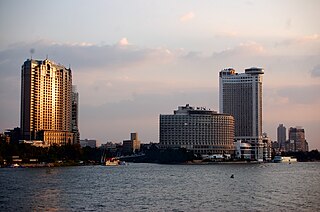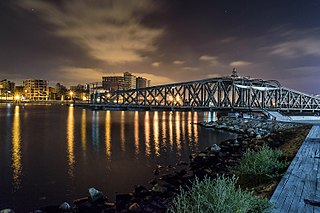
The Coptic Orthodox Church of Alexandria is an Oriental Orthodox Christian church based in Egypt, Africa and the Middle East. The head of the Church and the See of Alexandria is the Patriarch of Alexandria on the Holy See of Saint Mark, who also carries the title of Coptic Pope. The See of Alexandria is titular, and today the Coptic Pope presides from Saint Mark's Coptic Orthodox Cathedral in the Abbassia District in Cairo. The church follows the Alexandrian Rite for its liturgy, prayer and devotional patrimony. With 18–22 million members worldwide, whereof about 15 to 20 million are in Egypt, it is the country's largest Christian church.
A local government is a form of public administration which, in a majority of contexts, exists as the lowest tier of administration within a given state. The term is used to contrast with offices at state level, which are referred to as the central government, national government, or federal government and also to supranational government which deals with governing institutions between states. Local governments generally act within powers delegated to them by legislation or directives of the higher level of government. In federal states, local government generally comprises the third tier of government, whereas in unitary states, local government usually occupies the second or third tier of government, often with greater powers than higher-level administrative divisions.

The Maryland General Assembly is the state legislature of the U.S. state of Maryland that convenes within the State House in Annapolis. It is a bicameral body: the upper chamber, the Maryland State Senate, has 47 representatives and the lower chamber, the Maryland House of Delegates, has 141 representatives. Members of both houses serve four-year terms. Each house elects its own officers, judges the qualifications and election of its own members, establishes rules for the conduct of its business, and may punish or expel its own members.

The Senate is the upper house of the States General, the legislature of the Netherlands. Its 75 members are elected on lists by the members of the twelve States-Provincial and three Caribbean electoral colleges for the Senate every four years, within three months of the provincial elections. All provinces and colleges have different electoral weight depending on their population.

The 'Urabi revolt, also known as the 'Urabi Revolution, was a nationalist uprising in Egypt from 1879 to 1882. It was led by and named for Colonel Ahmed 'Urabi and sought to depose the Khedive Tewfik Pasha and end British and French influence over the country. Despite a French refusal to resort to arms and the pacifist proclamations of the Gladstone administration in Britain, the uprising was ended by a British bombardment of Alexandria and invasion of the country that left it under foreign control until after World War II.

The National Council of Provinces (NCOP) is the upper house of the Parliament of South Africa under the (post-apartheid) constitution which came into full effect in 1997. It replaced the former Senate, but is very similar to that body, and to many other upper houses of legislatures throughout the world, in that its purpose is to represent the governments of the provinces, rather than directly representing the people.

Election in Hong Kong take place when certain political offices in the government need to be filled. Every four years, half of the unicameral Legislative Council of Hong Kong's seventy seats representing the geographical constituencies are returned by the electorate; the other thirty five seats representing the functional constituencies are elected through smaller closed elections within business sectors.

Elections in Belgium are organised for legislative bodies only, and not for executive functions. Direct elections take place for the European Parliament, the bicameral Federal Parliament, the Parliaments of the Communities and Regions, the provincial councils, the municipal councils and a few district councils. Voting is mandatory and all elections use proportional representation which in general requires coalition governments.

Philippine elections are of several types. The president, vice-president, and the senators are elected for a six-year term, while the members of the House of Representatives, governors, vice-governors, members of the Sangguniang Panlalawigan, mayors, vice-mayors, members of the Sangguniang Panlungsod/members of the Sangguniang Bayan, barangay officials, and the members of the Sangguniang Kabataan are elected to serve for a three-year term.
Elections in Luxembourg are held to determine the political composition of the representative institutions of the Grand Duchy of Luxembourg. Luxembourg is a liberal representative democracy, with universal suffrage guaranteed under the constitution. Elections are held regularly, and are considered to be fair and free.

The Western Australian Legislative Council is the upper house of the Parliament of Western Australia, a state of Australia. It is regarded as a house of review for legislation passed by the Legislative Assembly, the lower house. The two Houses of Parliament sit in Parliament House in the state capital, Perth.

The West Virginia House of Delegates is the lower house of the West Virginia Legislature. Only three states—Maryland, Virginia, and West Virginia—refer to their lower house as the House of Delegates.

The Kerala Legislative Assembly, popularly known as the Niyamasabha, is the State Assembly of Kerala, one of the 29 States in India. The Assembly is formed by 140 elected representatives and one nominated member from the Anglo-Indian community. Each elected member represents one of the 140 constituencies within the borders of Kerala and is referred to as Member of the Legislative Assembly (MLA).

Parliamentary life in Egypt has been a mark of Egyptian civilizations along its history. In modern history, parliamentary life started as early as 1824 while representative parliamentary life did not start until 1866. In 2016, Egypt celebrated the 150th anniversary of Parliamentary life in their country.

The Legislative Council of Saint Helena has 15 members, 12 members elected for a four-year term by popular vote and 3 members ex officio. Members of the Council are referred to as Councillors and sometimes use the suffix "MLC", while the council itself is often referred to as "LegCo" by islanders officials.

The 1998 Hong Kong Legislative Council election was held on 24 May 1998 for members of the 1st Legislative Council of Hong Kong (LegCo) since the establishment of the Hong Kong Special Administrative Region (HKSAR) in 1997. Replacing the Provisional Legislative Council (PLC) strictly controlled by the Beijing government and boycotted by the pro-democracy camp, the elections returned 20 members from directly elected geographical constituencies, 10 seats from the Election Committee constituency and 30 members from functional constituencies, of which 10 were uncontested.

The first legislative council election to Madras Presidency after the establishment of dyarchical system of government by the Government of India Act, 1935, was held in November 1920. Indian National Congress boycotted the election due to its participation in the Non-cooperation movement. The election occurred during the early stages of non-Brahmin movement and the major issue of the election was anti-Brahminism. Justice party won the election with no significant opposition and A. Subbarayalu Reddiar became the first Chief Minister of the presidency.

Shura Council elections were held in Egypt between 29 January and 22 February 2012. The Freedom and Justice Party emerged as the largest party in the Council, winning 105 of the 180 elected seats.

Legislative Council elections were held in Burma on 21 November 1922, the first in the country's history.

General elections were held in Fiji in 1871 to elect members of the new Legislative Assembly.

























